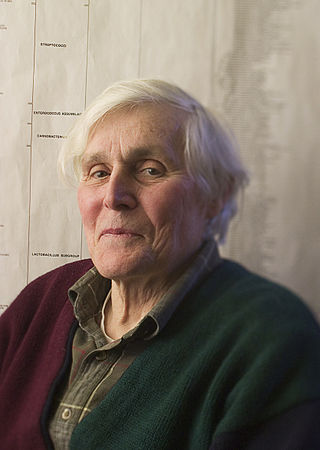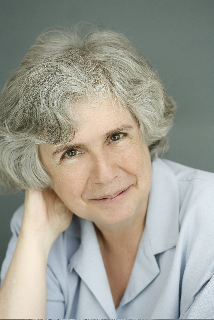Related Research Articles

Carl Woese was an American microbiologist and biophysicist. Woese is famous for defining the Archaea in 1977 through a pioneering phylogenetic taxonomy of 16S ribosomal RNA, a technique that has revolutionized microbiology. He also originated the RNA world hypothesis in 1967, although not by that name. Woese held the Stanley O. Ikenberry Chair and was professor of microbiology at the University of Illinois Urbana–Champaign.

Daniel Nathans was an American microbiologist. He shared the 1978 Nobel Prize in Physiology or Medicine for the discovery of restriction enzymes and their application in restriction mapping.

Metagenomics is the study of genetic material recovered directly from environmental or clinical samples by a method called sequencing. The broad field may also be referred to as environmental genomics, ecogenomics, community genomics or microbiomics.

Stanley "Stan" Falkow was an American microbiologist and a professor of microbiology at Georgetown University, University of Washington, and Stanford University School of Medicine. Falkow is known as the father of the field of molecular microbial pathogenesis. He formulated molecular Koch's postulates, which have guided the study of the microbial determinants of infectious diseases since the late 1980s. Falkow spent over 50 years uncovering molecular mechanisms of how bacteria cause disease and how to disarm them. Falkow also was one of the first scientists to investigate antimicrobial resistance, and presented his research extensively to scientific, government, and lay audiences explaining the spread of resistance from one organism to another, now known as horizontal gene transfer, and the implications of this phenomenon on our ability to combat infections in the future.

The Waksman Institute of Microbiology is a research facility on the Busch Campus of Rutgers University. It is named after Selman Waksman, a student and then faculty member at Rutgers who won the Nobel Prize for Medicine in 1952 for research which led to the discovery of streptomycin. The institute conducts research on microbial molecular genetics, developmental molecular genetics, plant molecular genetics, and structural and computational biology.

The College of Biological Sciences (CBS) is one of seven freshman-admitting colleges at the University of Minnesota. Established in 1869 as the College of Science, the College of Biological Science is now located across both the Minneapolis and the St. Paul campuses. As of June 29, 2023, the dean of the College of Biological Sciences is Dr. Saara J DeWalt.
Jeffrey Ivan Gordon is a biologist and the Dr. Robert J. Glaser Distinguished University Professor and Director of the Center for Genome Sciences and Systems Biology at Washington University in St. Louis. He is internationally known for his research on gastrointestinal development and how gut microbial communities affect normal intestinal function, shape various aspects of human physiology including our nutritional status, and affect predisposition to diseases. He is a member of the National Academy of Sciences, the American Academy of Arts and Sciences, the Institute of Medicine of the National Academies, and the American Philosophical Society.
Dr. Hazel A. Barton is an English born microbiologist, geologist and cave diving explorer, interested in extremophile microorganisms. She is a Professor and Director of the Integrated Bioscience Program at the University of Akron and has appeared in several documentaries.
The Selman A. Waksman Award in Microbiology is awarded by the U.S. National Academy of Sciences "in recognition of excellence in the field of microbiology." Named after Selman Waksman, it was first awarded in 1968. A $5000 prize is included in the honor.

Edward Francis DeLong, is a marine microbiologist and professor in the Department of Oceanography at the University of Hawaii, Manoa, and is considered a pioneer in the field of metagenomics. He is best known for his discovery of the bacterial use of the rhodopsin protein in converting sunlight to biochemical energy in marine microbial communities.
Richard High Ebright is an American molecular biologist. He is the Board of Governors Professor of Chemistry and Chemical Biology at Rutgers University and Laboratory Director at the Waksman Institute of Microbiology.
Scott A. Strobel is the provost of Yale University as well as a professor of molecular biophysics and biochemistry. He was the vice provost for Science Initiatives and vice president for West Campus Planning & Program Development. An educator and researcher, he has led a number of Yale initiatives over the past two decades. Strobel was appointed as Yale's provost in 2020.
The Massry Prize was established in 1996, and was administered by the Meira and Shaul G. Massry Foundation until 2019. The Prize, of $40,000 and the Massry Lectureship, is bestowed upon scientists who have made substantial recent contributions in the biomedical sciences. Shaul G. Massry, M.D., who established the Massry Foundation, is Professor Emeritus of Medicine and Physiology and Biophysics at the Keck School of Medicine, University of Southern California. He served as Chief of its Division of Nephrology from 1974 to 2000. In 2009 the KECK School of Medicine was asked to administer the Prize, and has done so since that time. Ten winners of the Massry Prize have gone on to be awarded a Nobel Prize.

Susan Gottesman is a microbiologist at the National Cancer Institute (NCI), which is part of the National Institutes of Health. Gottesman has been the editor of the Annual Review of Microbiology since 2008.

Emmanuelle Marie Charpentier is a French professor and researcher in microbiology, genetics, and biochemistry. As of 2015, she has been a director at the Max Planck Institute for Infection Biology in Berlin. In 2018, she founded an independent research institute, the Max Planck Unit for the Science of Pathogens. In 2020, Charpentier and American biochemist Jennifer Doudna of the University of California, Berkeley, were awarded the Nobel Prize in Chemistry "for the development of a method for genome editing". This was the first science Nobel Prize ever won by two women only.

Mitchell Sogin is an American microbiologist. He is a distinguished senior scientist at the Marine Biological Laboratory in Woods Hole, Massachusetts. His research investigates the evolution and diversity of single-celled organisms.
Ralph R. Isberg is a professor at Tufts University School of Medicine known for his contributions to understanding microbial pathogenesis. He is a member of the American National Academy of Sciences and was an investigator of the Howard Hughes Medical Institute for 27 years. A microbiologist, Isberg has published over 185 peer-reviewed articles and is or has been an editor of the Proceedings of the National Academy of Sciences, PLoS Pathogens, and Journal of Experimental Medicine, among others.
Stephen Joseph Giovannoni is an American microbiologist whose research mainly focuses on marine microbes. He is a fellow of the American Academy of Microbiology and a founding co-editor of the Annual Review of Marine Science.
Ruth E. Ley is a British-American microbial ecologist. Ley was an associate professor in the Department of Microbiology and the Department of Molecular Biology and Genetics at Cornell University until 2018. She is currently serving as the director of the Microbiome Science Department at the Max Planck Institute for Biology.

Jamie S. Foster is an American astrobiologist, microbiologist, and academic. She is a professor at the Department of Microbiology and Cell Science, and Genetics and Genomes Graduate Program at the University of Florida.
References
- ↑ "Book of Members, 1780-2010: Chapter P" (PDF). American Academy of Arts and Sciences. Retrieved 16 April 2011.
- ↑ "Norm Pace — MCD Biology University of Colorado Boulder". Mcdb.colorado.edu. Retrieved 2010-10-31.
- ↑ "Pace Lab- Dr. Norm Pace". Pacelab.colorado.edu. Retrieved 2010-10-31.
- 1 2 Microbiology pioneer and leader Norm Pace to present special seminar, Indiana University, May 1, 2018
- ↑ Pace, Norman R. (August 24, 2018). "The small things can matter". PLOS Biology . 16 (8): e3000009. doi: 10.1371/journal.pbio.3000009 . PMC 6126870 . PMID 30142153.
- ↑ Pace, Norman Richard (1967). In Vitro Studies Of Viral Rna Replication (Ph.D.). University of Illinois at Urbana-Champaign. OCLC 932256982. ProQuest 302231264.
- ↑ Watanabe, Myrna (September 6, 1993). "Huge Microbe's Value Lies In More Than Just Sheer Size". The Scientist Magazine .
- ↑ "Norman Pace « Profile « Directory « NASA Astrobiology". Astrobiology.nasa.gov. Archived from the original on 2009-08-27. Retrieved 2010-10-31.
- ↑ Fuhrman, Jed A. (August 1, 2012). "Metagenomics and its connection to microbial community organization". F1000 Biol. Rep. 4 (15): 15. doi: 10.3410/B4-15 . PMC 3410722 . PMID 22912649.
- ↑ Yong, Ed (July 20, 2017). "The Man Who Blew The Door Off The Microbial World". The Atlantic .
- ↑ "Lew Bicking Award Recipients".
- ↑ "Lew Bicking Award Recipients".
- ↑ "Membership Directory: Norman R. Pace". National Academy of Sciences .
- ↑ "Selman A. Waksman Award in Microbiology". National Academy of Sciences. Archived from the original on 29 December 2010. Retrieved 27 February 2011.
- ↑ "CU-Boulder Microbiologist Receives National Academy Of Sciences Award | News Center | University of Colorado at Boulder". Colorado.edu. 2001-01-18. Retrieved 2010-10-31.
- ↑ "CU-Boulder Biology Professor Wins 2001 MacArthur Fellowship | News Center | University of Colorado at Boulder". Colorado.edu. 2001-10-24. Retrieved 2010-10-31.
- ↑ Knoss, Trent (August 9, 2017). "2017 Massry Prize honors Norman Pace". CU Boulder Today.
- ↑ "Academy Honors 18 for Major Contributions to Science". National Academy of Sciences (Press release). January 23, 2019.